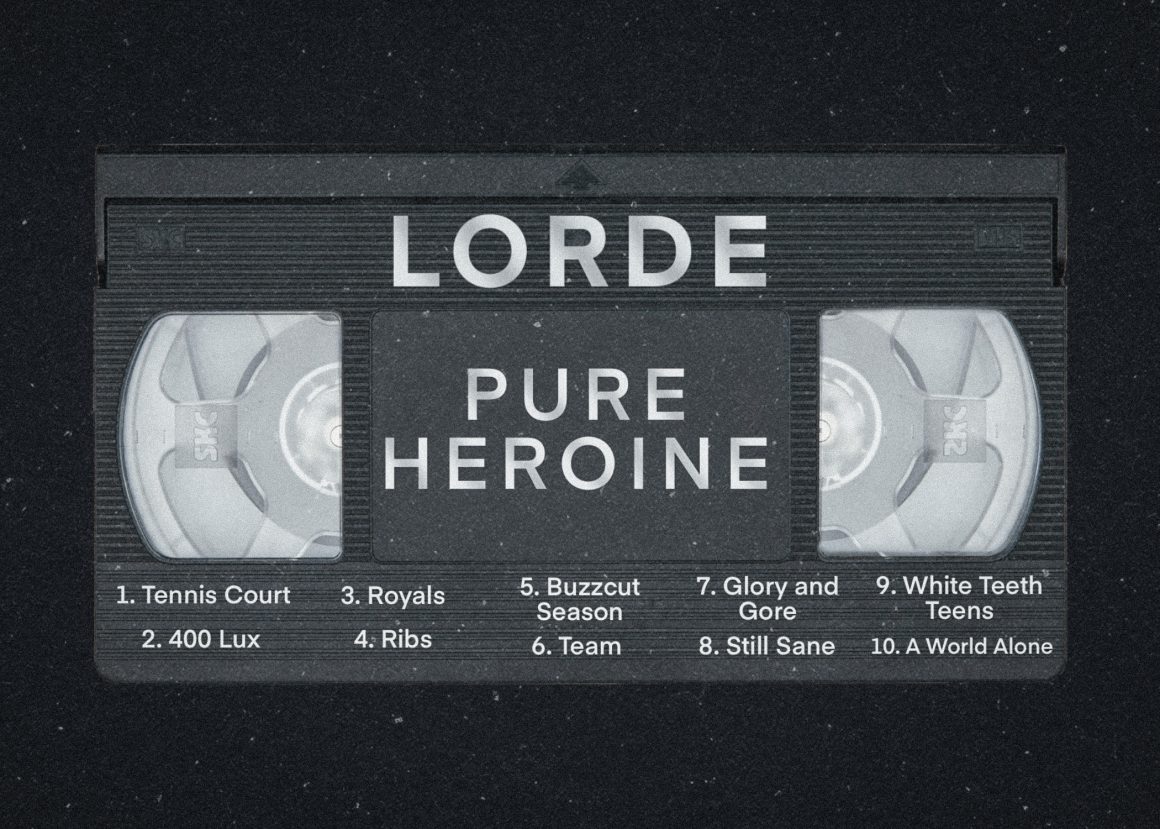
Ten years of Lorde’s Pure Heroine
By Ansharah Shakil, September 27 2023—
Singer-songwriter Lorde, born Ella Yelich-O’Connor, went from a relative unknown to an at times controversial musical icon with three albums under her belt: her painfully genuine debut Pure Heroine, the critically acclaimed Melodrama and her latest album Solar Power, full of quickly snuffed out promise. This August, Lorde performed new songs during a Cornwall concert, currently set to remain unreleased. Despite longing for new content, Lorde’s fanbase can remain satisfied with what they have: two of the most pristine indie pop albums of the 21st century, the first of which is about to celebrate its 10th anniversary. In September of 2013, when Pure Heroine was first released, it blew all expectations out of the water. Ten years later, it still does.
There are not many who wouldn’t recognize the distinctive, nostalgic snaps of “Royals”, the first single for Pure Heroine, which spent weeks in the number-one spot on the Billboard charts. In some ways, Lorde has never lived down the widespread popularity of “Royals”, which condemned mainstream materialism but ironically spent a great deal of time on pop radio alongside songs which glorified what “Royals” denounced.
Lorde was by necessity distinguished from her pop peers, only 16 when she rose to fame, releasing covers of The Replacements and Tears For Fears alongside covers of Kanye West. She encompassed a number of ages on Pure Heroine, sounding at once wise beyond her years and unbearably young. That’s part of the album’s magic.
It’s impossible to touch the tender heart that is Melodrama, an album of skillful and exquisite dimensions. It’s easy to criticize Solar Power because it frankly deserves it — the bland production and lacking lyrics make for an uninteresting album, especially considering the build-up to its release. The flaws in Pure Heroine, however, are definitely messy, a challenge for the pop music scene of the 2010s, for the perceived image of teenagers and for anyone listening. There isn’t anything I would change about it.
On Melodrama, Lorde had grown up. On Pure Heroine, she immortalized the occasionally painful process of growing up; the idea that you don’t forget who you were in your most impressionable ages, when it felt sometimes like the whole terrifying world was against you but sometimes like you could conquer the whole world.
Pure Heroine kicks off with Lorde singing “Don’t you think it’s boring how people talk?” in “Tennis Court” and ends with “People are talking / Let ‘em talk” from “A World Alone.” Extended editions of the album would later add five more songs, and the extra tracks are as excellent as the rest of the album, standouts being “Bravado” and “The Love Club,” with lyrics that feel so raw they cut down to the bone. But when we’re talking about Pure Heroine as it first was, its bookend, its development from the first line of “Tennis Court” to the last line of “A World Alone,” is intentional.
Of the many themes explored in Pure Heroine — social alienation, loneliness, boredom, consumer culture, the internet, fame — the most poignant is the album’s status as a coming-of-age album, one that isn’t cliche but is self-aware. It’s not that Pure Heroine is intrinsically relatable for every single teenager or person in the world but instead that it remains resonant, real, a breath of fresh air.
The production is minimalistic but meticulous, and the phonaesthetic lyrics and smoky vocals are compelling throughout. Lorde grabs your attention right away in tracks like “Still Sane”, narrating her own complex feelings about fame. “Today is my birthday and I’m riding high / Hair is dripping, hiding that I’m terrified,” she sings. “But this is summer, playing dumber than in fall / Everything I say falls right back into everything.” The production swoops in with well-timed percussion as soon as her voice dips into a lower register past the strung-out first verse.
The quality of the album remains constant from the evocative imagery and sweet lyrics of “400 Lux” to the haunting, nostalgic, apocalypse-fuelled “Buzzcut Season” — and of course, “Team,” a love letter to Lorde’s hometown. It’s a track that’s addictive — the claps in the background are reminiscent of the snaps in “Royals” — and full of bittersweet sentiment. Two of the other best tracks on the album, though, are “Ribs” and “A World Alone.” There isn’t really a song on the album that can compare to “A World Alone.” Its delicate guitar notes, perfectly timed drum beats and wistful background whispers combine with the croon of Lorde’s voice and her immaculate, gut-wrenching lyrics to create something impossible to forget.
“Ribs”, meanwhile, is vulnerable and dreamy, with a pulsing electronic beat beneath the lyrics that lend the song a quiet and transfixing quality even as Lorde’s voice gains intensity. “Ribs” fully captures the frightening headlong rush towards becoming an adult, whatever that may mean. “It feels so scary getting old,” Lorde sings, but it’s been 10 years since “Ribs”, and by now Lorde has grown as much as her old songs have.
She’s survived and stood the test of time; so has Pure Heroine, and it’s an album that won’t ever grow old.
